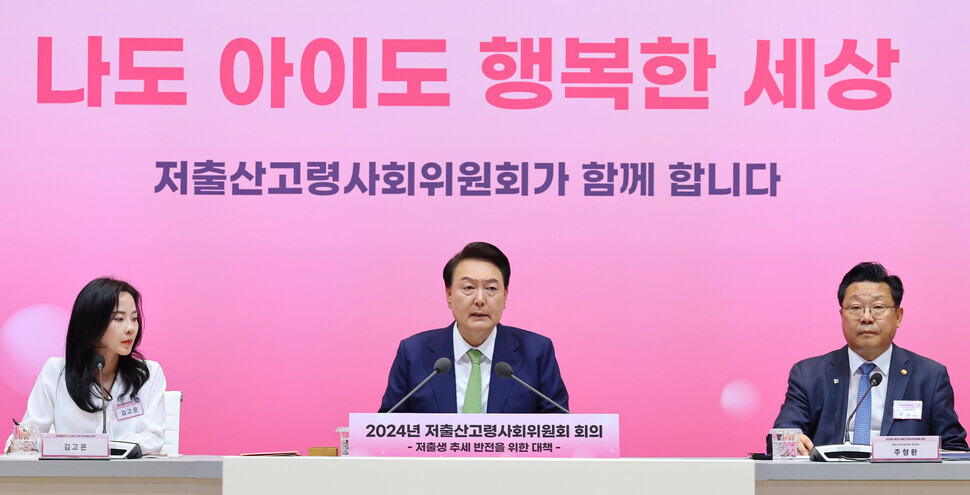hankyoreh
Links to other country sites 다른 나라 사이트 링크
Korea declares ‘national emergency’ over birth rates, but offers few new solutions

South Korea’s president declared a “national emergency” on Wednesday regarding the country’s plummeting birth rates and shrinking population, vowing to “mobilize all response systems until the crisis is resolved.”
The Yoon Suk-yeol administration has proposed increasing pay for workers on parental leave as well as introducing a system that allows parents a period of “short-term parental leave.” The government has announced its goal of raising the country’s total fertility rate — the average number of children a woman is expected to have throughout her lifetime, which was a dismal 0.72 last year — to 1 by 2030. Some say that current state policies seem insufficient for reaching this goal.
Yoon presided over a meeting of a presidential committee formed to solve problems associated with an aging society and a plummeting birth rate at a child care center in HD Hyundai's R&D Center in Seongnam, Gyeonggi Province.
“Our country’s most fundamental and fatal issues are directly tied to a shrinking population resulting from a falling fertility rate. We will soon face an existential crisis that concerns the very survival of the Korean nation,” he said.
During a press conference on May 9 to commemorate two years in office, Yoon announced plans to create a government ministry specifically tasked with addressing the demographic crisis. On Wednesday, the president announced that such a department will be tentatively known as the “Ministry of Population Strategy Planning.” The presiding minister, Yoon announced, will also serve as the deputy prime minister for social affairs. The ministry will be granted the authority to review budgets related to solving the crisis and act as the administrative control tower over the relevant policymaking process.
The government announced a series of policies on Wednesday regarding three major areas: the balance between working and domestic duties, childrearing, and housing. These policies include raising the minimum parental leave pay from 1.5 million won (US$1,084) a month to between 1.6 (US$1,157) and 2.5 million (US$1,807) a month, depending on the length of leave.
Standard parental leave would be supplemented by an additional two weeks of paid time off that parents could take as needed. To ease the burdens of childrearing, parents would be able to leave their children at daycare centers and preschools for up to 12 hours. Starting in 2027, the state plans on offering free preschool and education services for children aged 3 to 5 years.
Starting in 2025, households raising newborns will be eligible for special low-interest loans toward purchasing or renting a home, so long as their yearly income is 250 million won (US$180,700) or below for three continuous years. Households with children will also receive more tax benefits. They will also be eligible for lotteries in bids for public or subsidized housing, even if one person in the couple was previously selected before having children.
Yet critics say these measures are insufficient for raising Korea’s birth rate. The additional measures, they say, are merely an expansion of previous policies or ways that make it easier for people to take advantage of them, such as increased paternity leave and additional parental leave.
“Overall, the policies increase subsidies related to childrearing,” said Lee Chul-hee, a professor of economics and director of Seoul National University’s Institute for Future Strategy.
“While these measures are likely to directly benefit married couples that are middle-class or higher by reducing their financial expenditures and opportunity costs, there are still blind spots that do not cover low-income families.”
By Lee Seung-jun, staff reporter
Please direct questions or comments to [english@hani.co.kr]

Editorial・opinion
![[Column] How opposing war became a far-right policy [Column] How opposing war became a far-right policy](https://flexible.img.hani.co.kr/flexible/normal/500/300/imgdb/original/2024/0702/5017199091002075.jpg) [Column] How opposing war became a far-right policy
[Column] How opposing war became a far-right policy![[Editorial] Korea needs to adjust diplomatic course in preparation for a Trump comeback [Editorial] Korea needs to adjust diplomatic course in preparation for a Trump comeback](https://flexible.img.hani.co.kr/flexible/normal/500/300/imgdb/original/2024/0702/9717199086060096.jpg) [Editorial] Korea needs to adjust diplomatic course in preparation for a Trump comeback
[Editorial] Korea needs to adjust diplomatic course in preparation for a Trump comeback- [Editorial] Silence won’t save Yoon
- [Column] The miscalculations that started the Korean War mustn’t be repeated
- [Correspondent’s column] China-Europe relations tested once more by EV war
- [Correspondent’s column] Who really created the new ‘axis of evil’?
- [Editorial] Exploiting foreign domestic workers won’t solve Korea’s birth rate problem
- [Column] Kim and Putin’s new world order
- [Editorial] Workplace hazards can be prevented — why weren’t they this time?
- [Editorial] Seoul failed to use diplomacy with Moscow — now it’s resorting to threats
Most viewed articles
- 110 days of torture: Korean mental patient’s restraints only removed after death
- 2Nine dead in Seoul after car plows into pedestrians
- 3Japan is building a military meant for more than self-defense — and has the US to thank for it
- 4[Column] How opposing war became a far-right policy
- 5[Editorial] Silence won’t save Yoon
- 6[Editorial] Korea needs to adjust diplomatic course in preparation for a Trump comeback
- 7Yoon’s prosecutors are throwing everything at the president’s opponents to see what’ll stick
- 8Samsung Electronics workers to go on first strike in company’s 55-year history
- 9Korea to create dedicated population strategy ministry to combat low birth rate, aging society
- 10[Column] The miscalculations that started the Korean War mustn’t be repeated